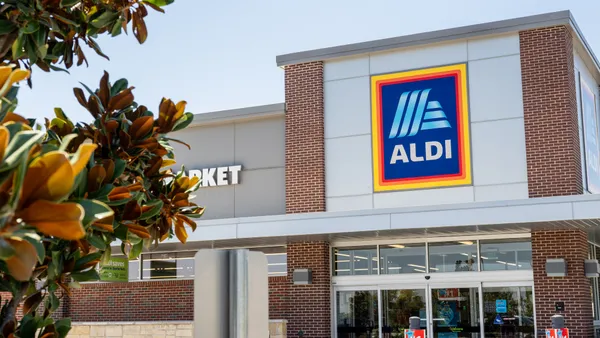Dive Brief:
- Walgreens has linked up with Instacart to expand its same-day delivery service at nearly 8,000 stores nationwide, the companies announced in a press release Tuesday.
- Stores in Illinois will offer the service Tuesday, with stores in other states joining over the coming weeks. Shoppers will be able to order over-the-counter medications, health and wellness items, grocery, personal care and beauty products for delivery in as little as an hour.
- The move continues Instacart’s expansion beyond grocery as it reportedly approaches an initial public offering. For Walgreens, the tie-up is one more step in a digital transformation that has included investments in its app, media network, loyalty program and online fulfillment.
Dive Insight:
Walgreens began offering same-day delivery back in 2015, but like many other retailers, it didn’t get serious about the service until the coronavirus pandemic struck. Last spring, it expanded its partnership with Postmates nationwide and in the summer linked up with DoorDash.
With Instacart, Walgreens is tapping into a provider that has seen usership explode over the past year. While retailers have scrambled to adjust their fulfillment operations, Instacart was able to quickly flex its gig workforce to meet sky-high online grocery demand. Instacart aims to lock in customer loyalty with its membership program, which waives fees on delivery orders over $35.
Walgreens has rapidly shifted its business toward digital as competition in prescription fulfillment as well as packaged goods has increased. The retail pharmacy provider recently relaunched its loyalty program and mobile app. In December, it rolled out a full-service media network, joining a host of other retailers offering marketers access to first-party shopper data. It has also piloted programs like drive-thru order pickup and Kroger-branded mini grocery stores.
The company aims to stay ahead of close rival CVS as well as Amazon, which launched its own prescription platform and delivery service last year. Walgreens is also facing pressure from pharmacy startups like Capsule and Ro, as well as from retailers like Costco that also offer prescription delivery.
Instacart has faced pushback from grocery retailers eyeing automation and relying more on their own workers to handle rising order volumes. But experts say store-based fulfillment partnerships are a good fit for retailers that see modest online demand and don’t wish to invest in structural changes to support e-commerce.
Instacart’s fulfillment capabilities may eventually have to flex beyond its cutting-edge software and army of gig shoppers. The company has been exploring automated fulfillment centers for almost a year and has engaged in talks with Fabric and Alert Innovation, two main providers in the space, according to a Financial Times report over the weekend. The report said Instacart has yet to strike a deal and has so far faced weak interest from retailers reluctant to extend their partnerships with the company.
Reports have noted Instacart, which garnered $200 million in new funding last fall, could soon go public, and the company's rapid onboarding of new executives supports that development.









